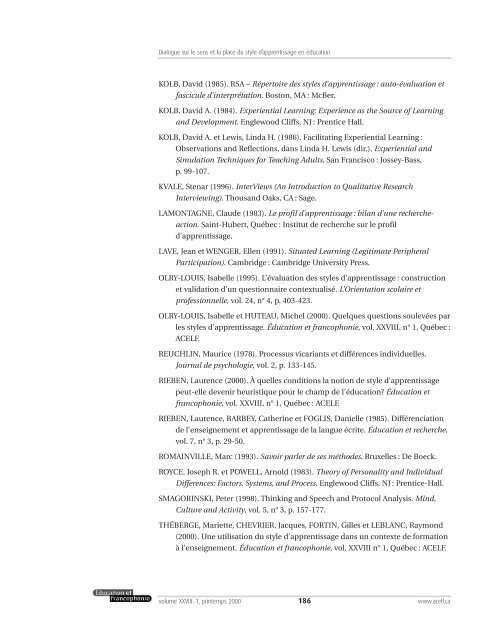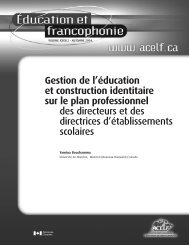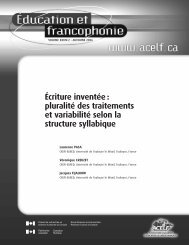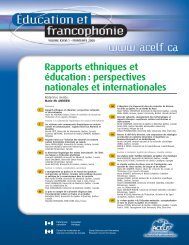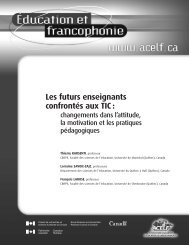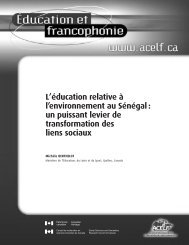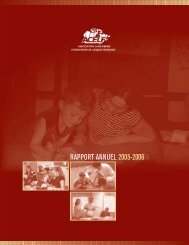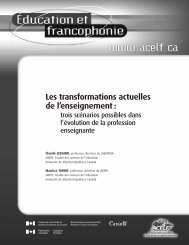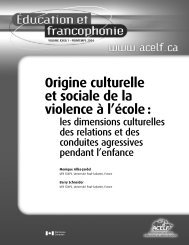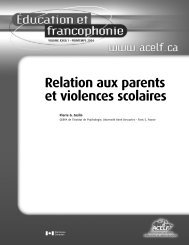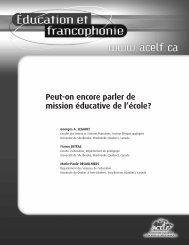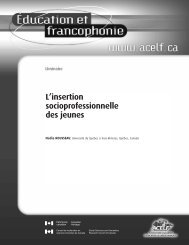You also want an ePaper? Increase the reach of your titles
YUMPU automatically turns print PDFs into web optimized ePapers that Google loves.
Dialogue sur le sens et la place du <strong>style</strong> d’apprentissage en éducationKOLB, David (1985). RSA – Répertoire des <strong>style</strong>s d’apprentissage : auto-évaluation etfascicule d’interprétation. Boston, MA : McBer.KOLB, David A. (1984). Experiential <strong>Le</strong>arning: Experience as the Source of <strong>Le</strong>arningand Development. Englewood Cliffs, NJ : Prentice Hall.KOLB, David A. et <strong>Le</strong>wis, Linda H. (1986). Facilitating Experiential <strong>Le</strong>arning :Observations and Reflections, dans Linda H. <strong>Le</strong>wis (dir.), Experiential andSimulation Techniques for Teaching Adults. San Francisco : Jossey-Bass,p. 99-107.KVALE, Stenar (1996). InterViews (An Introduction to Qualitative ResearchInterviewing). Thousand Oaks, CA : Sage.LAMONTAGNE, Claude (1983). <strong>Le</strong> profil d’apprentissage : bilan d’une rechercheaction.Saint-Hubert, Québec : Institut de recherche sur le profild’apprentissage.LAVE, Jean et WENGER, Ellen (1991). Situated <strong>Le</strong>arning (<strong>Le</strong>gitimate PeripheralParticipation). Cambridge : Cambridge University Press.OLRY-LOUIS, Isabelle (1995). L’évaluation des <strong>style</strong>s d’apprentissage : constructionet validation d’un questionnaire contextualisé. L’Orientation scolaire etprofessionnelle, vol. 24, n° 4, p. 403-423.OLRY-LOUIS, Isabelle et HUTEAU, Michel (2000). Quelques questions soulevées parles <strong>style</strong>s d’apprentissage. Éducation et francophonie, vol. XXVIII, n° 1, Québec :ACELF.REUCHLIN, Maurice (1978). Processus vicariants et différences individuelles.Journal de psychologie, vol. 2, p. 133-145.RIEBEN, Laurence (2000). À quelles conditions la notion de <strong>style</strong> d’apprentissagepeut-elle devenir heuristique pour le champ de l’éducation? Éducation etfrancophonie, vol. XXVIII, n° 1, Québec : ACELF.RIEBEN, Laurence, BARBEY, Catherine et FOGLIS, Danielle (1985). Différenciationde l’enseignement et apprentissage de la langue écrite. Éducation et recherche,vol. 7, n° 3, p. 29-50.ROMAINVILLE, Marc (1993). Savoir parler de ses méthodes. Bruxelles : De Boeck.ROYCE, Joseph R. et POWELL, Arnold (1983). Theory of Personality and IndividualDifferences: Factors, Systems, and Process. Englewood Cliffs, NJ : Prentice-Hall.SMAGORINSKI, Peter (1998). Thinking and Speech and Protocol Analysis. Mind,Culture and Activity, vol. 5, n° 3, p. 157-177.THÉBERGE, Mariette, CHEVRIER, Jacques, FORTIN, Gilles et LEBLANC, Raymond(2000). Une utilisation du <strong>style</strong> d’apprentissage dans un contexte de formationà l’enseignement. Éducation et francophonie, vol. XXVIII n° 1, Québec : ACELF.volume XXVIII : 1, printemps 2000186www.<strong>acelf</strong>.ca


